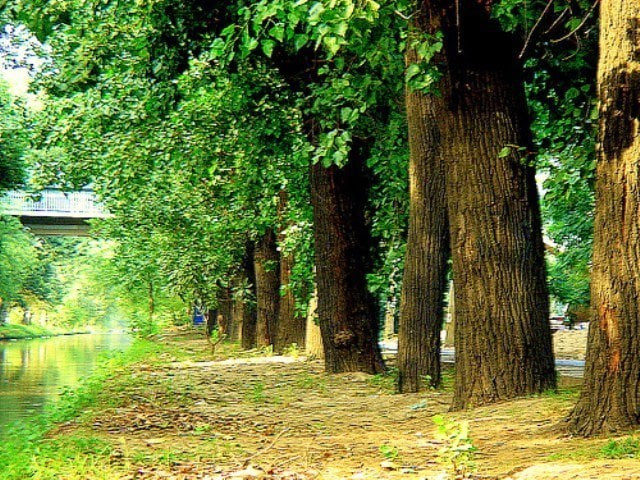The year Pakistan started its fight to be greener
Govt launched nationwide plantation drive, banned plastic bags but remains slow to implement them

Billion Tree Tsunami project. PHOTO: FILE
During 2019, the government embarked on a host of projects to mitigate the effects of climate change. This included a five-point agenda such as the Ten Billion Tree Tsunami (TBTT) project, the Electric Vehicle Policy, Plastic-Free Islamabad, Recharge Pakistan Programme, Clean Green Index and Green Initiative and the Green Finance Initiative.
The Rs125 billion TBTT project will see some five billion saplings being planted across the country in the first phase. To be completed over the next five years, the project aims to add trees and cover area equivalent to a percentage of the total forest area in Pakistan.
In this regard, he told The Express Tribune that the government’s entire focus was on the five-point agenda.
The federal and the provincial governments will equally share the project’s cost while the governments of Azad Jammu and Kashmir (AJK) and Gilgit-Baltistan (G-B) will be exempted from the share and the entire cost of the project in both regions will be borne by the federal government, said Adviser to Prime Minister's on Climate Change Malik Amin Aslam.
According to the project concept (PC)-I, Punjab will plant 0.53 billion saplings for Rs58 per sapling — for a total of Rs3074 billion. Similarly, Sindh will plant 2 billion saplings at a cost of Rs5 per sapling for a total of Rs10 billion, Khyber-Pakhtunkhwa (K-P) will plant a billion saplings for Rs27 billion, Balochistan will plant 0.25 billion saplings for Rs16 billion, G-B will plant 0.17 billion trees at a cost of Rs6.97 billion. Similarly, AJK will plant 0.7 billion saplings at a cost of Rs20 billion and the National Highway Authority (NHA) will plant 1.4 million saplings at a cost of Rs2.34 billion.
Speaking to The Express Tribune, he said that of the Rs7.5 billion allocated for the first phase of the project Rs3.75 billion has been released so far in the fiscal year 2019-20.
Plastic ban
Even as it pushes for a greener character of the country, the government has started efforts to counter pollutants in the country as well.
As an initial step, it imposed a ban on usage of non-biodegradable polythene bags in the federal capital from August 14, 2019.
As some government lawmakers described the date as ‘independence from plastic day’, the district administration imposed with relative success the ban on sale, purchase, retail, manufacturing, distribution, and import of plastic bags in the federal capital.
Some residents welcomed the move while others grumbled at the inconvenience it caused. However, since the ban on plastic was not universal, many goods continued to be found wrapped in the substance.
Moreover, the government allowed conditional use of polythene bags in industries, including primary industrial, municipal, hospital waste and hazardous waste packaging. Companies could continue the use of these bags if they obtained permission from the competent authority by meeting specific conditions and paying an annual fee worth Rs10,000.
Clean and Green Pakistan Index
Another initiative which has the potential to act as a catalyst for improving cleanliness in cities and improve their green character with the ‘Clean and Green Pakistan Index (CGPI).
Cities participating in the programme — a competition of sorts between different cities and regions with additional funds the prize — will take environment-friendly steps and gain points on the index.
In the first phase of the programme, as many as 19 cities across Punjab and Khyber-Pakhtunkhwa (K-P) will be pitted against one another.
They will compete on subjects such as the provision of basic facilities to citizens, including safe drinking water, solid waste management, liquid waste management, city beautification, cleanliness of streets, the usability of parks, tree plantation, sanitation and community participation.
The CGPI, the government hopes, will serve as a barometer of how clean and environment-friendly cities are. Their performance will be gauged over six months on five parameters: including tree plantation, safe water, safe sanitation, hygiene as well as liquid and solid waste management.
Electric vehicle policy
Another policy aimed at improving the environment was the electrical vehicle policy introduced by the government. The policy aims to convert around 30 per cent of vehicles across the country to the more environment–friendly technology by 2030.
Published in The Express Tribune, January 1st, 2020.


1724319076-0/Untitled-design-(5)1724319076-0-208x130.webp)
















COMMENTS
Comments are moderated and generally will be posted if they are on-topic and not abusive.
For more information, please see our Comments FAQ